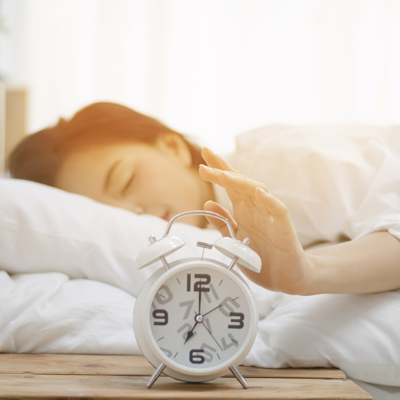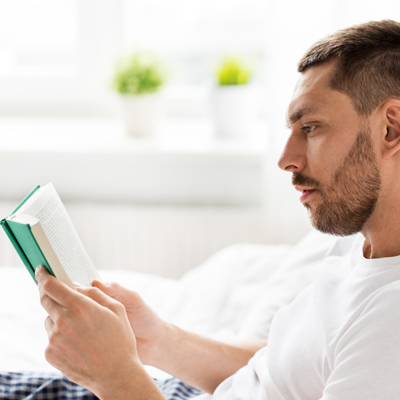The Utlimate Sleep Guide: 50 Sleep Tips & Tricks
23-08-2017

Sleeping well positively affects your physical and mental health, and the quality of your working life. The vice versa is true; if you are not getting the right quality and quantity of sleep, it can take a serious toll on your productivity, weight, daytime energy, and even your emotional balance. According to the 2016 Sleep Health Survey of Australian Adults by the Sleep Health Foundation, “Lack of proper sleep has adverse effects on one’s health, social, and work life.” The survey goes on to state that 33%-45% of Australians have poor sleep patterns that put them at risk of mental damage, unsafe behaviours, and low productivity.
Simply put, sleep is crucial to our health, but the problem is that it’s hard to get enough time for sleep or sleep comfortably for that matter.
Think about all the factors that can impede your sleep—from family responsibilities and work stress to unforeseen life challenges such as illnesses. It’s no wonder that peaceful sleep is becoming increasingly elusive for many. It's an assertion that’s supported by findings of research released during World Sleep Day, which was conducted by the “Westin Hotels and Resorts.” The study revealed that 94% of Australians aren’t getting restful sleep. The report also outlined that “Only 1 out of every 4 Australians are getting 8 hours of sleep. The average sleep time for Australians is 6.5 hours.” This is below the recommended guidelines.
"How can I improve my sleep?" is one of the most common questions we hear at Ergoflex.
Here are fifty super-simple ways to improve your nightly sleep, whether you're looking for a solution to a sleep problem, general sleep advice or lifestyle tips that could help boost your sleep quality. From advice on how to sleep with anxiety to turning your bedroom into a relaxing sleep sanctuary, these easy tips might just make the difference between a sleepless night and an effortless trip to the land of nod.

1. Exercise—exercising regularly can help you fall asleep better and more soundly—as long as you do it at the right time and not at the expense of your sleep. Exercise helps the body secrete a certain stress hormone called cortisol, which activates the brain to remain active. By exercising and remaining active during the right time of the day, you’ll be getting your brain and body prepared for sleep at night. Vigorous workouts are the best, but even the lightest exercise is better than none.
2. Time Your Workouts—while keeping fit is essential, it is also important to know how to go about it, especially the timing. It is vital to give your body time to recover after a workout to avoid creating a state of over-exertion during the time you should be winding down and getting ready for sleep. It’s advisable to do light exercise at least 3 hours before bedtime for optimal sleep quality.
3. Shower Before Bedtime—taking a shower before bed can help with a peaceful night's sleep. The body undergoes a temperature change before and during sleep, with a cooling down signalling the onset of sleep. An evening shower can help with this process, as the body adjusts after being under warm water in the steamy bathroom environment. By timing the shower around an hour before going to bed you’re effectively triggering the body into the optimum pre-sleep state. Indeed, research shows that taking a bath before sleeping relieves stress and anxiety collected throughout the day.
4. Try Aromatherapy—aromatherapy has long been used in stress management and relaxation practices. This approach has also been used extensively to improve the quality of sleep. Some essential oils such as Ylang Ylang, Sandalwood, and Lavender have been proven to have powerful calming effects making them suitable for sleeping routines. There are different ways to use these oils—you can spray the aroma in your bedroom, burn diffuser sticks in your bedroom, or simply use them as bathing ingredients.
5. Eat Light and at the Right Time—munching on a pepperoni pizza thirty minutes before bedtime may be the recipe for your insomnia or restlessness. It is important to finish your dinner 2-3 hours before hitting the sheets, and completely avoid foods that encourage indigestion.
 6. Eat Right—as seen in tip 5 above, diet and sleep are inextricably linked. A bad night’s sleep can put the body into something of an emergency state in which quick energy is demanded. This can lead to both poor food choices – high fat junk foods – and disrupted meal times. The sudden energy hit provided by such foods is always followed by an equally sudden slump, and the cycle begins again. This can lead to a whole host of issues, but when it comes specifically to sleep it usually results in the body being completely unprepared for bedtime… leading to a bad night and the cycle beginning again. In contrast, a good night’s sleep gives the body the energy required to start the day, stick to regular mealtimes and avoid the cravings for foods that will upset the process.
6. Eat Right—as seen in tip 5 above, diet and sleep are inextricably linked. A bad night’s sleep can put the body into something of an emergency state in which quick energy is demanded. This can lead to both poor food choices – high fat junk foods – and disrupted meal times. The sudden energy hit provided by such foods is always followed by an equally sudden slump, and the cycle begins again. This can lead to a whole host of issues, but when it comes specifically to sleep it usually results in the body being completely unprepared for bedtime… leading to a bad night and the cycle beginning again. In contrast, a good night’s sleep gives the body the energy required to start the day, stick to regular mealtimes and avoid the cravings for foods that will upset the process.
7. Lose Weight—excessive weight is associated with a number of sleeping problems not least in relation to obstructive sleep apnoea, a sleep disorder that is linked to a number of serious medical conditions. Good sleep is a natural foundation for a healthy lifestyle, and the two can go hand-in-hand. Starting with exercise and diet changes, an improvement in sleep quality can occur naturally. By getting regular good sleep you’re far more likely to stick to a healthy diet and avoid the pitfalls that can make losing weight particularly difficult.
8. Review Your Medication—some medications such as SSRIs (a class of antidepressants such as Zoloft and Prozac) and Beta-blockers (prescribed for high blood pressure) may cause insomnia. Write down all the supplements and medications that you take and have your doctor evaluate how they may be affecting your sleep.
9. Create a Dark Environment—a room ideal for sleep is cool, dark and quiet. Light is very powerful for energizing the body, so try to make your bedroom as dark as possible while you sleep. Invest in some blackout blinds/curtains, or if that’s not possible then a simple eye-mask will offer a reasonable alternative.
10. Keep the Bedroom Cool—a cool temperature is also ideal for getting a good night's sleep. The body goes through complex processes during the night, including shifts in temperature. While thermoregulation is something that the body does naturally, it’s important to have the right room temperature to avoid disrupting sleep. A slightly cool 60 to 67 Degrees Fahrenheit or 15-20 Degrees Celsius is said to be optimum for good sleep. Anything significantly cooler or warmer is likely to trigger your body into reacting, causing restlessness.
11. Consider Colours—colours are known to create different moods, and are extremely vital when creating a bedroom fit for sleeping. Colours that speak warm and cool are great in bedrooms as they help create sleep-friendly moods. Reds and yellows for instance, in the warm part of the colour palette, can create a sense of energy and vibrancy, while ‘cooler’ blues and greens give off an altogether more relaxed atmosphere – making them more appropriate for the bedroom.
12. Clear the Clutter—always ensure that your bedroom and bed are free of any mess. A tidy bedroom provides a distraction-free, inherently calming environment where the mind is free to relax into sleep. A chaotic bedroom creates the opposite.
 13. Nap Wisely—a timely nap can provide adequate energy to carry you throughout the day, but it’s a complicated thing to get right. For instance, experts say that by sleeping for about 20 minutes in the afternoon (around 2pm) can significantly boost your body energy, but if this nap is extended it can have an adverse effect on the quality of your sleep during the night. So nap wisely.
13. Nap Wisely—a timely nap can provide adequate energy to carry you throughout the day, but it’s a complicated thing to get right. For instance, experts say that by sleeping for about 20 minutes in the afternoon (around 2pm) can significantly boost your body energy, but if this nap is extended it can have an adverse effect on the quality of your sleep during the night. So nap wisely.
14. Know Your Sleeping Position—everyone has a preferred sleeping position and it is important that you get into this position as soon as you get in the bed. This reduces the chances of restlessness during the onset of sleep, and falling into the early stage of sleep in a position that you won’t be able to stay in for a significant length of time. The ‘best’ sleeping position is the one that works for you, and if you’re finding that for any reason you’re not able to get into it – for instance an uncomfortable or poorly-sized mattress, a disturbing partner or a physical condition – then you need to make a change to accommodate it.
15. Choose a Comfortable Mattress— you spend over 6 hours on your mattress every night, and over 42 hours a week. Your mattress should, therefore, be a comfort zone. It should be of a fine and enduring quality to give you the perfect sleeping platform. From waking up with aches and pains, to physically feeling inconsistent parts of the surface (such as permanent dents and indentations), there are lots of ways you can tell when your mattress has given up the ghost. As soon as you start noticing these issues it’s time to change, or your health could suffer as a result of continuously poor sleep. Naturally we recommend memory foam and our award winning mattress.
16. Pick the Right Pillow—like your mattress, your pillows too have to be comfortable if you’re to have an attractive and inviting sleep. Pillows are a hugely personal choice, but with so much depending on them it’s well worth finding one that works for you.
17. Form a Clear Work/Life Balance—train your mind and body to know when to work and when to relax. It is important to use working hours for work and strictly avoid using your leisure time for working. This can be particularly difficult for those working from home. Being stricter with work-related behaviour (such as checking emails) in the home can be the start of creating a better work/life balance that results in a more rested mind.
18. Be Tough On Pets—pets can have a powerfully calming effect, so it’s no surprise that some of us allow them to stay in the bedroom (or even the bed) overnight. No matter how much we love them, sometimes they disturb us too much and generally affect the quality of our sleep. If you have this kind of a pet that commands too much space and frequently wakes you up, then it’s time to banish them from the bedroom.
 19. Avoid Excessive Caffeine— did you know that caffeine can interrupt your sleep even 10 to 12 hours after taking it?! Avoid severe consumption of caffeine-containing beverages such as cola, chocolate, tea, and coffee.
19. Avoid Excessive Caffeine— did you know that caffeine can interrupt your sleep even 10 to 12 hours after taking it?! Avoid severe consumption of caffeine-containing beverages such as cola, chocolate, tea, and coffee.
20. Avoid Nicotine Too—as with caffeine, nicotine is also rated among the top intruders of sleep. Smoking has been associated with insomnia, especially if done a few hours before bedtime.
21. Limit Excessive Alcohol—the link between alcohol and sleep is widely misunderstood. While excessive alcohol consumption can often result in the rapid onset of tiredness, it doesn’t promote anything like good sleep. Alcohol is a diuretic, which means you’ll need the toilet more regularly than unusual, breaking sleep. The sleep that you do achieve will be light and fitful, preventing the body from going through the natural phases that make up a good night’s sleep. Think about the feeling of a hangover and subsequent exhaustion – does that resemble waking up after a rejuvenating night of deep sleep?
22. Drink Right—beware of what you drink in the evening hours. Too much drink will result in several ‘short-call’ breaks during the night. This can be annoying and may also disturb your sleep partner.
23. Try Herbal Tea—even though herbal teas may not be as sweet as coffee or normal tea, they can have a highly effective botanical properties, and some varieties can be very sleep-friendly. Valerian, lavender, and chamomile are some of the known herbal teas that are believed to be super relaxants and can provide an impeccable early evening wind down.
24. Stick to Your Sleeping Schedule— it turns out that our body craves consistency! With regular activities, your body systems are able to prepare for and anticipate events. For instance, our digestive system becomes activated as soon as we approach meal times. We also naturally tend to be more alert close to our wake time. The body’s sleep/wake cycles (cardiac rhythms) follow a regular schedule, and therefore, by keeping a regular sleep schedule will help keep this rhythm in sync which reduces chances of sleep disruption.
 25. Obey the Alarm—once you set the alarm, obey it. You snooze you lose. We know hitting the snooze button is one of the most tempting things, but those few minutes you take after you snooze may be difficult to wake up from, and you may carry this lethargy throughout the day and later into the night. As mentioned, stick to your sleeping routine!
25. Obey the Alarm—once you set the alarm, obey it. You snooze you lose. We know hitting the snooze button is one of the most tempting things, but those few minutes you take after you snooze may be difficult to wake up from, and you may carry this lethargy throughout the day and later into the night. As mentioned, stick to your sleeping routine!
26. Respect Sleep—some people will only go to sleep when they can’t take it anymore; some will find themselves dozing off on the couch watching TV. Remember, regular sleep is vital to your health and happy life overall. If you are treating sleep as something that should be avoided, you are greatly risking your health. It is, therefore something that should be respected and taken seriously.
27. Manage Your Worries—try to resolve your concerns and worries before you decide to sleep. Meditation, delegating tasks, and setting priorities can be possible solutions to your worries.
28. A Lot on Your Mind? Write a List—one of the most common barriers to falling asleep is a racing mind in which thoughts, ideas and worries can seem to run wild. This is totally normal and likely a result of the distractions of the day suddenly disappearing while the mind is still decidedly active. If this is a regular problem then it’s a good idea to get those thoughts out of your head and on paper, in the form of a list. Even just the practice of noting down whatever you’re thinking about can help ‘unload’ your mind. Remember the list isn’t going anywhere, and you’re better equipped to tackle it during the day when your mind is suitably rested.
29. Get Up—sometime you can't fall asleep even if you try. If this happens, it’s advised that you get out of bed for a short time and try to do an activity that might relax and sooth your mind like listening to music or reading a book. Sometimes the more you try falling asleep the more you fall out of it!
30. Take an Alternative Approach—Low-impact exercises that focus on both physical and mental aspects are almost tailor-made for good sleep, as they help condition both the body and mind. Yoga and Pilates are perhaps the two most popular and accessible forms of such alternative exercise, and with a little dedication can become part of a healthy lifestyle in which good sleep comes naturally.
31. Cut-Out the Noise—noise is never good for sleep. Whether it’s from a busy street, snoring partner, or a simple hum from an electronic device, noise can keep you stressed, sleep-deprived, and frustrated. Sometimes it may be simple to control the noise by simply switching off noise-emitting devices. But what if you have a party animal neighbour? What if your partner snores like a dyspeptic bull? You don’t have to worry, a simple set of foam earplugs can often do the trick. The market is filled with these lo-fi noise prevention devices, and they come in different prices, sizes, and shapes. You can also install acoustic tiles to block excessive noise from the street. These tiles are used in recording studios and are normally very effective in absorbing and blocking excessive noise.
32. Make Use of Positive Sleep Technology—besides sound proofing technology, there exists other numerous technologies that deliver sleep-friendly results. There are sleep-tracking devices that you can wear or that exist on your smartphone. There are smart alarms, and white noise machines that can be used to improve the quality of your sleep.
 33. Your Bed Should Strictly Be for Sleep—reserve your bed strictly for sleep. Avoid using your bed to do other activities such as using your laptop, watching television, or a place for using your tablet or smartphone. These activities not only delay the onset of sleep, but they can also encourage insomnia. If you reserve your bed exactingly for sleeping, you automatically set your mind into relaxed state once you set foot in the bedroom.
33. Your Bed Should Strictly Be for Sleep—reserve your bed strictly for sleep. Avoid using your bed to do other activities such as using your laptop, watching television, or a place for using your tablet or smartphone. These activities not only delay the onset of sleep, but they can also encourage insomnia. If you reserve your bed exactingly for sleeping, you automatically set your mind into relaxed state once you set foot in the bedroom.
34. Screen-Free Winding Down—before you go to bed it’s really important to wind down away from the light emitted by computers, tablets, TVs, and smartphones. This kind of light replicates the light emitted during the day and may create a powerful response in your body and mind. Winding down away from these lights allows you to fall asleep quicker, which promotes a better sleep throughout the night.
35. Let Go of FOMO—while the endless flow of information and entertainment from social media has its time and place, that time really shouldn’t be when you’re trying to go to sleep. Forget that fear of missing out and check out for the night. You’ll be able to catch up on your feeds in the morning and your body will thank you for it.
36. Maintain Clean Sheets—the feeling of getting into bed with freshly washed sheets is one of life’s little pleasures, helping create a sense of comfort that positively encourages relaxation. However, we found back in 2013, in a survey that made headlines around the world, that a lot of us aren’t exactly prioritising cleanliness in the bed. The most shocking finding we uncovered was that 55% of single men aged between 18-25 washed their bed sheets on average every 3.1 months. Putting basic hygiene worries aside, by keeping used bed sheets on for such extended periods of time increases the likelihood of bed bugs and dust mites inhabiting the space.
37. Choose and Maintain Your Pyjamas Well—what you wear to bed will have an impact on the quality of your sleep; it’s that simple. This too comes down to your personal preference, but if you find that your PJs are in any way hindering your sleep, it’s time for a change.
38. Change Your Bedding with the Season-since temperature plays a key role in determining sleep quality it makes sense to change your bedding periodically throughout the year. Typically a spring/summer and autumn/winter duvet will suffice, and help avoid extreme temperatures disturbing sleep.
39. Consider Sleeping Phases—during a night of undisturbed sleep, the body experiences five different phases of sleep at various points. These start with light dozing (Stage 1) through to deep sleep (Stage 4) and REM sleep (Stage 5) before starting over again, and alternating through different stages throughout the night. Each full cycle through the stages can take around 100 minutes. So, it’s completely normal to experience a very light sleep phase where you’re feeling partially awake in the middle of the night. It’s not a sign of poor sleep quality, and it’s important to avoid worrying about it or allowing the mind to click into wakefulness.
 40. Read a Book— reading stories for children before bedtime has always worked like magic. This can also be true for adults. According to the National Sleep Foundation, reading a book before you sleep helps your body separate your sleep time and stresses of the day. They also argue that relaxing reading rituals can help you sleep faster and enjoy a higher quality of sleep throughout the night. Warning though! Steer clear of scary novels! You wouldn’t want nightmares, would you?
40. Read a Book— reading stories for children before bedtime has always worked like magic. This can also be true for adults. According to the National Sleep Foundation, reading a book before you sleep helps your body separate your sleep time and stresses of the day. They also argue that relaxing reading rituals can help you sleep faster and enjoy a higher quality of sleep throughout the night. Warning though! Steer clear of scary novels! You wouldn’t want nightmares, would you?
41. Listen to Music—music is the perfect antidote for falling to sleep. Choose the kind of music that relaxes you and soothes you to sleep. A tip—well-chosen ambient and classical music are popular for providing that calming and restful vibe.
42. Get Your Morning Routine Right—just like it is important to have a consistent bedtime routine, a consistent and positive morning routine will help improve the quality of your sleep. Getting out of bed at the right time every morning, eating a healthy breakfast, and attending to your daily routine in good time sets your mind and body in the right mood which will be carried through to your bedtime.
43. Go For a Sleep-Friendly Breakfast—everyone’s heard the old saying “Breakfast is the most important meal of the day”, well, it turns out it’s not only true but it’s also linked to your overall sleep quality. By starting the day with a healthy and substantial breakfast will sustain you not only during the day, but also throughout the night. Besides, by eating healthy in the morning, it will help you stick to regular meal times and avoid junk foods that produce slumps and spikes that may interfere with your sleep.
44. Go Outside During the Day—daily exposure to natural light is believed to play a big role in regulating your body’s cardiac rhythm, which is very essential in ensuring your body spends energy at the right time. During the night, your body will naturally be ready for a good night sleep.
45. Prepare a Sleep Diary—you’ll be amazed by how writing down the basic details of your sleep can be helpful towards attaining a quality sleep. Things like when you went to bed, how long it took you to fall asleep, what’s normally on your mind when you go to bed, how you feel after a night's sleep, and the time you wake up among many other things. This can be very beneficial in determining the underlying factors behind your troubled sleep. In fact, a sleep diary is normally required when you are under a sleep study.
46. Deep Breathing—difficulties in breathing will definitely disturb your sleep. Deep breathing exercises are believed to relax your body and mind, as well as regulate your heart rate and prepare you for a good night's sleep. Before you jump into your bed, simply take in some deep breaths and slowly exhale; repeat this for a few minutes and you will be ready to go!
47. Try Mindfulness—mindfulness is a practice that has gained in popularity over recent years, as more of us try to combat busy lives. In short, mindfulness is the concept of being mentally present. One of the many benefits of being present in the moment is avoiding overbearing thoughts of the past or the future… which is to say the things that tend to pop into the mind and prevent sleep just at the wrong time. The thoughts can (and will) of course come into your head, but mindfulness allows for them to be waved on without creating undue stress – making it the perfect sleep-friendly skill to deal with an active nocturnal mind.
 48. Avoid Sleeping Pills—sleeping pills definitely provide a quick fix to your sleep problems, but in the long run, they will be problems in their own way. By constantly using sleeping pills and aids, you’ll be conditioning your body to keep relying on them to sleep. Soon you’ll create a reliance which will eventually lower the chances of overcoming the problem.
48. Avoid Sleeping Pills—sleeping pills definitely provide a quick fix to your sleep problems, but in the long run, they will be problems in their own way. By constantly using sleeping pills and aids, you’ll be conditioning your body to keep relying on them to sleep. Soon you’ll create a reliance which will eventually lower the chances of overcoming the problem.
49. Think of Ways of Helping Your Partner—it’s common to have a snoring or twitchy partner. In fact, this is among the top reasons why most people have poor sleep quality. If you have one of these partners, it is important that you educate them on ways of good sleep hygiene. The moment they address their sleeping issues, they’ll get better quality sleep and you will too.
50. Know When to Seek Help—for all the sleep advice and best practice available, it’s a fact that sleep is an incredibly complex and variable process. As such, there are a number of sleep disorders that require medical diagnosis and intervention. From widely-understood issues such as sleep apnoea to the more mysterious sub-set of conditions known as ‘parasomnias’, some sleep issues need very specific treatments as they’re linked to other health problems. If you feel that you’re suffering from such a condition it’s important to get professional help at the earliest opportunity.
Some of these tips and tricks may be easier to execute during your daily and nightly routine than others. But there is no doubt that trying and sticking to them will certainly improve the quality of your sleep. Of course, the list is endless; you can achieve a restful sleep by simply changing into comfy PJs or listening to soothing music—it’s all about what relaxes and comforts you!
Further Reading
If you enjoyed this article you will find the below of interest:
Introducing the all-new Ergoflex 5G Memory Foam Mattress
How much sleep does your star sign need?
What is the Best Mattress for Back Pain?
